#theodore herzl
Explore tagged Tumblr posts
Text
#anti zionisim#deir yassin#theodor herzl#west bank#south africa#israel is evil#Hebron#jerusalem#Theodore herzl#gaza#New York Times#فلسطين#al khalil#albert einstein#palestine#free palestine#free gaza#zionistterror#Zionists are Nazis#israel#israeli war crimes#nazis#israel is a terrorist state#israel is an apartheid state#israelis are terrorists#i stand with palestine#israel is a war criminal#israel is a settler colony#israel is a genocidal state#israeli apartheid
43 notes
·
View notes
Text
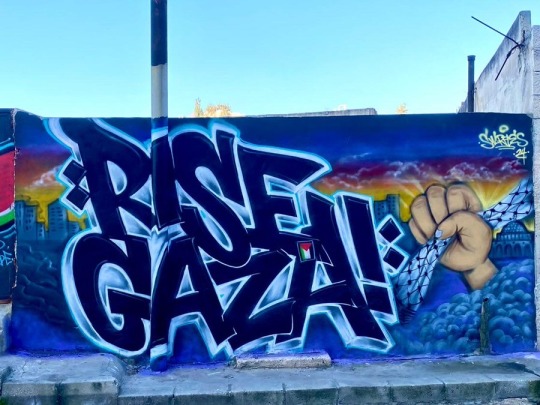
Don’t make me tap the sign: Israel and Zionism do not speak for all of Judaism (they fuckin wish) and attempts to conflate criticism of Israel w/ antisemitism will not be tolerated here.
It is not antisemitic to criticize genocide, but Zionism, by its very definition IS founded upon antisemitism. “So long as anti-Semitism existed, assimilation would be impossible, and the only solution for the majority of Jews would be organized emigration to a state of their own.” (Source)
I’m the worst and can’t remember where I took this from, but I do believe the graffiti is somewhere in Libya.
#free palestine#palestine#fallout#gaza#graffiti#rise Gaza#save Rafah#israel lies#stop israel#israel is a terrorist state#from the river to the sea palestine will be free#Zionism#theodore herzl#palestine solidarity#solidarity
3 notes
·
View notes
Text
"Theodore Herzl’s heartbreaking family history is marked by psychopathy, severe depression, and suicide, and his wife and all three of his children suffered from varying degrees of mental illness."
#Zionism is not a cure










... assimilation, liberalism, and an enlightened education would finally bring an end to antisemitism and Jewish isolation. 👈🏼
https://www.jewishpress.com/sections/features/features-on-jewish-world/the-tragic-story-of-herzls-family/2022/06/29/
#zionism#theodore herzl#cult#israeli atrocities#israeli apartheid#israeli occupation#israeli terrorism#right wing extremism#palestine#palestinians#gaza#genocide#war on children#civilian deaths#greater israel#illegal annexation#illegal occupation#illegal settlements#settler colonialism#free palestine#free gaza#justice#war crimes#idf terrorists#iof terrorism#iof war crimes#us weapons#us complicity#pariah state#rogue nation
1 note
·
View note
Text
#theodore herzl#cecil rhodes#colonialism#imperialism#israeli imperialism#western imperialism#western colonialism#british colonialism#tiktoks
1 note
·
View note
Text
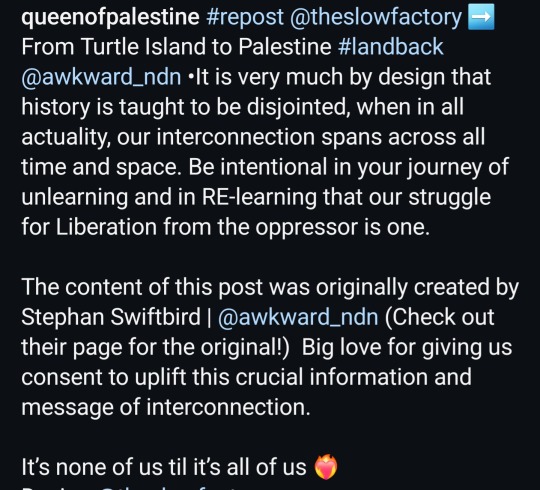
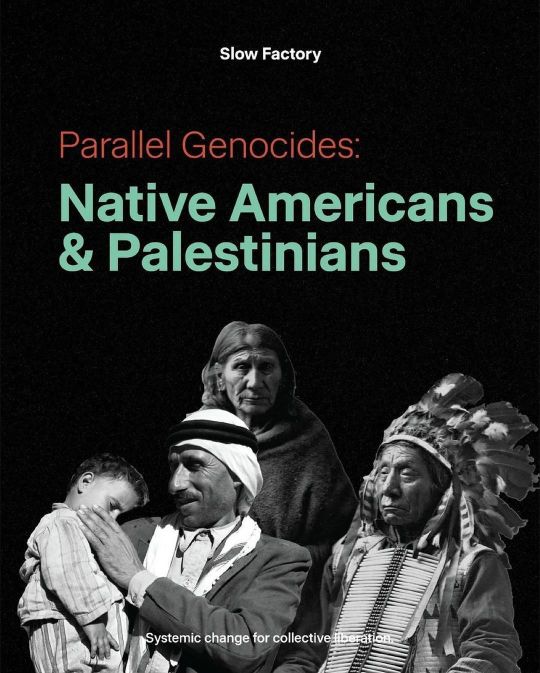
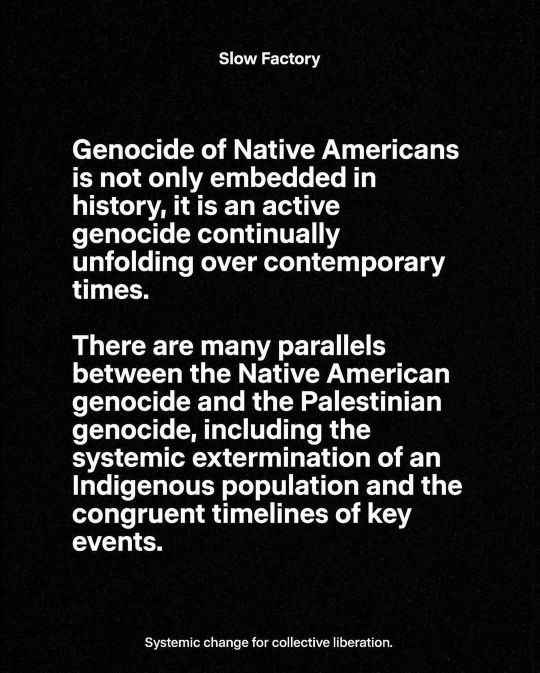
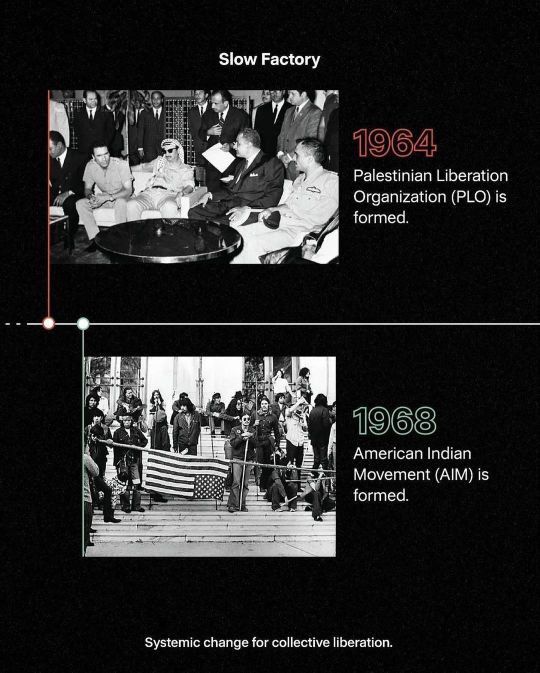
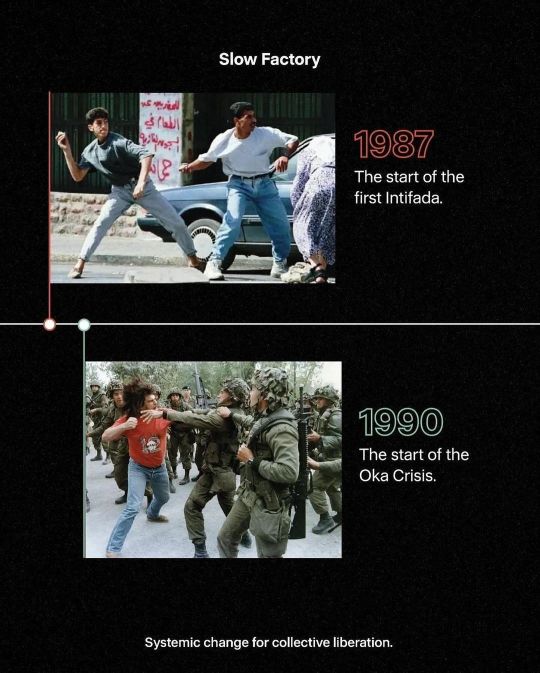
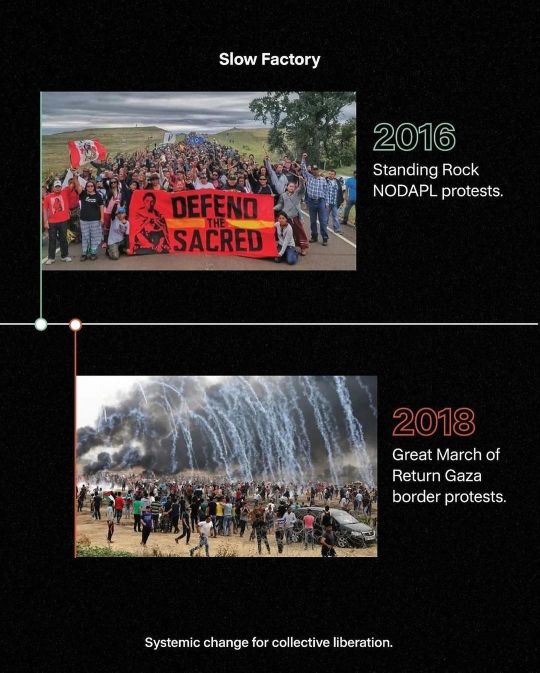
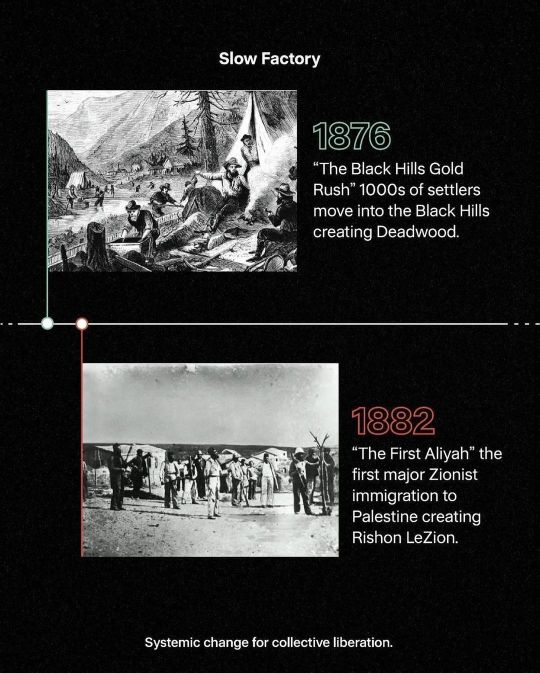
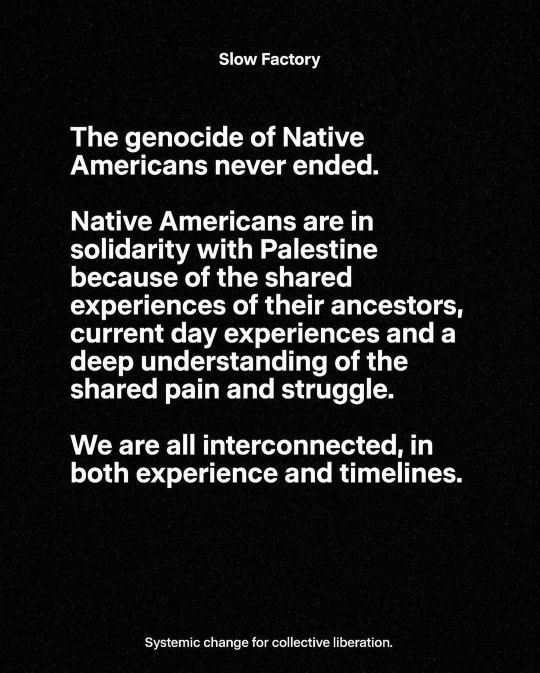
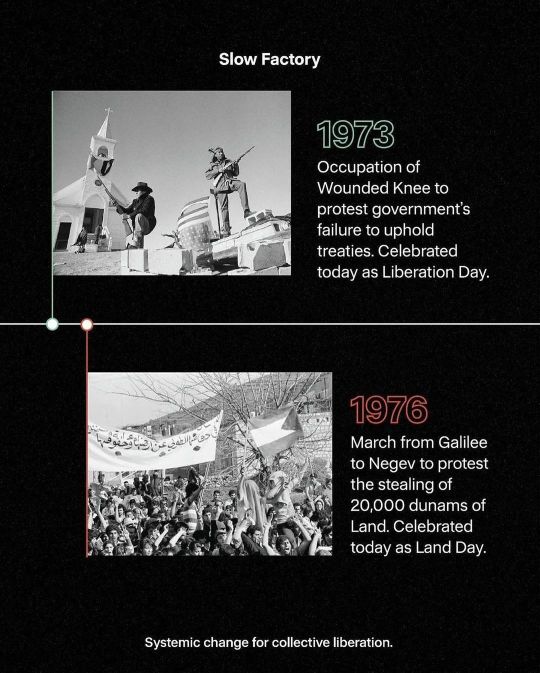
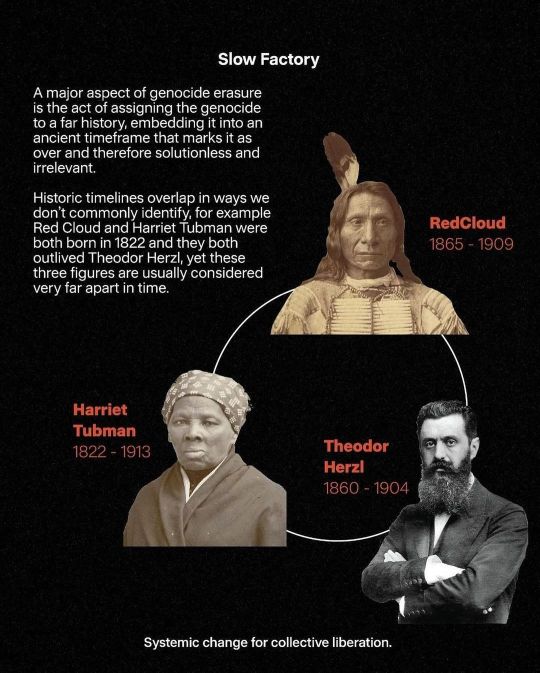
#native americans#Palestinians#apartheid#save palestine#israel is an apartheid state#ethnic cleansing#free palestine 🇵🇸#genocide#AIM#PLO#Wounded Knee#Trail of Tears#Great March of Return#iof war crimes#iof terrorism#israel is an illegal occupier#illegal settlements#reservations#Red Cloud#theodor herzl#zionism is nazism for the 21st century#connected in grief#solidarity#parallel genocides#extermination of indigenous peoples
124 notes
·
View notes
Note
Maybe don't say you want to eat all Zionists if you don't want to be told not to do that idk :/
(Also not that you'll care but political Zionism and the version of Zionism that just says 'Jews should be able to visit or live in the Levant since it once was our home and if nowhere else is safe for us, there at least should be' are different and saying they're deserving of equal condemnation and violence or that those people should die is kinda fucked of you)
(Also also you shouldn't get to choose who lives or who dies regardless of how bad of people they are according to you. Like idk how to explain to you that you shouldn't think the right to be alive is conditional.)
As a Muslim i obviously cannot condone eating ppl since its not halal and especially fascist lil piggies are sure to be extra haram and yucky :)). Idgaf about some version of zionism that existed at some point and meant something positive when there is a real version out there that is fucking fascist and responsible for the death of hundreds of thousands of people. N literally no one ever forbade Jewish ppl from visiting or living in the Levant. Youll be surprised to find that there were in fact many Jewish ppl living in Palestine prior to 1948, many of them immigrants from other countries. Also nice fucking job at equating Jewish ppl w zionists ya 7mar. Idgaf about what you think the rights of ppl should be that are indulging a fascist and genocidal ideology, if you dont wanna be eaten by the wolf dont be zionist, its That easy❤. And its absolutely hysterical how you fall in line w the ppl who cry that Jewish ppl are safe nowhere else, like maybe that should be fixed instead of shipping everyone off, away from the places that have been their homes for centuries, plus the fact that you are the same ppl bitching about how "israel" is surrounded by murderous Arabs who wanna toss all the Jewish ppl in the sea. Like make up your mind, cuz that doesnt sound safe to me.
Lastly whats kinda fucked is your cognitive function and ability to think for yourself, clearly. Israeli politicians and Zionists in the West literally calling to wipe Gazans off the face of the earth, using the same language Nazis did. Idk ya might wanna readjust your priorities a bit. Now you better climb a tree or smt bc the wolf is imprinted on your scent and its coming for youuu 🐺
#lol#lmao even#10000 wiped out and you got the audacity whime about the term zionism#travel back in time and off ben gurion amd theodor herzl if its such a big concern for you#whos oomf is this#pls reclaim your garbage chold
424 notes
·
View notes
Text
Herzl: hey check out this novel I wrote about how cool it would be to have a society where Jews and Arabs and Greeks and Armenians all came together in the Levant to live as equals in a thriving multicultural society and revitalize the land after the ravages of the Ottoman Empire!
anti-Zionist: ZIONISM IS A RACIST IDEOLOGY THAT HAS ALWAYS BEEN ABOUT REPLACING INDIGENOUS ARABS WITH JEWS EVEN HERZL ADMITTED IT WAS ABOUT COLONIALISM
Herzl:

248 notes
·
View notes
Text
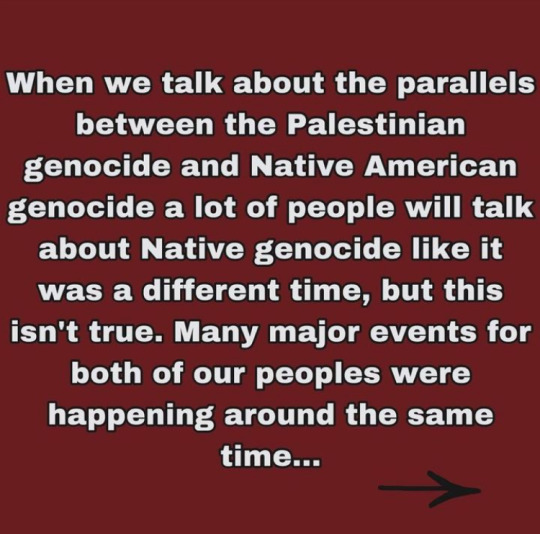
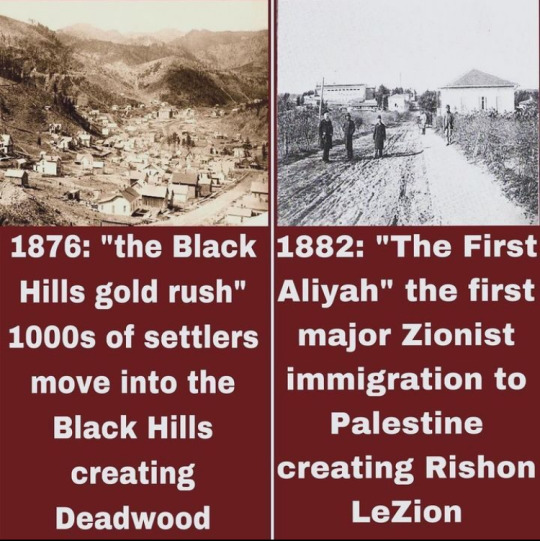
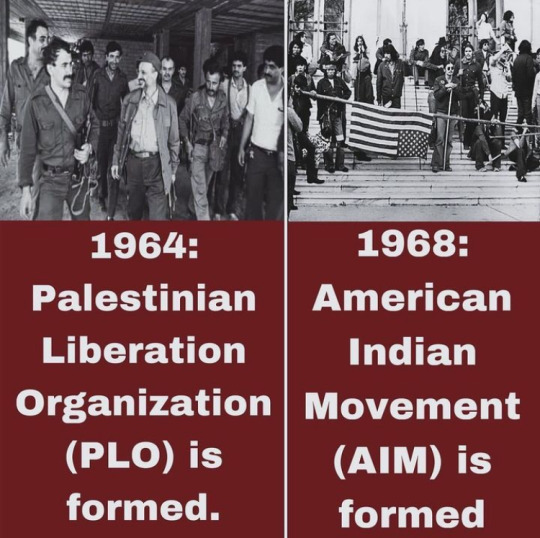
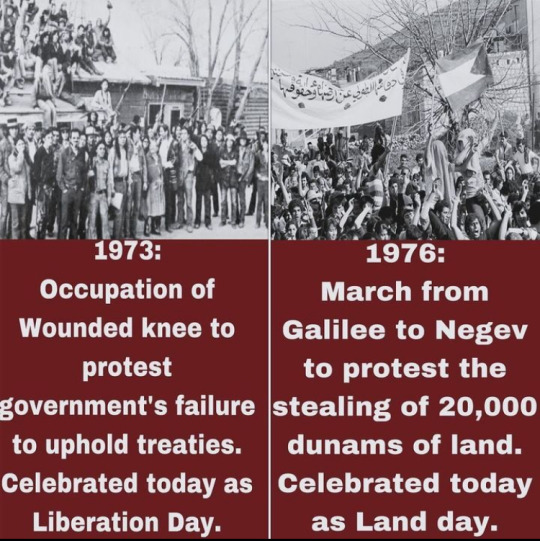

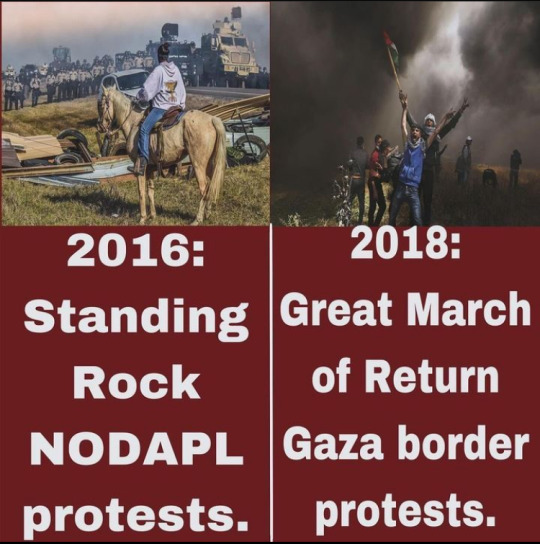
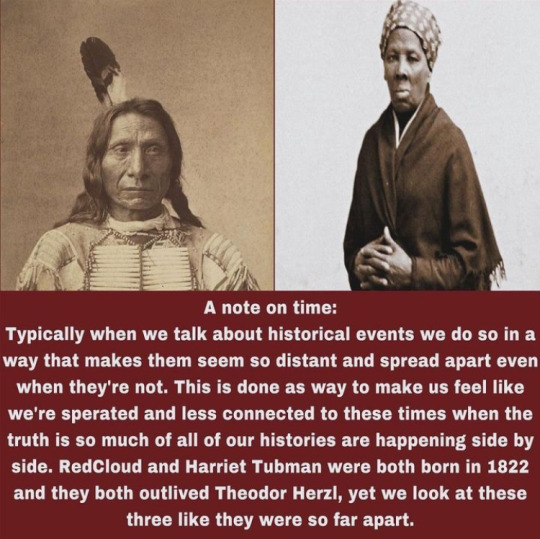
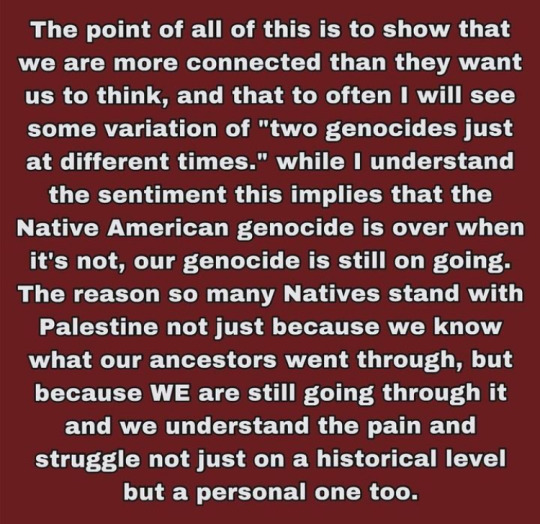
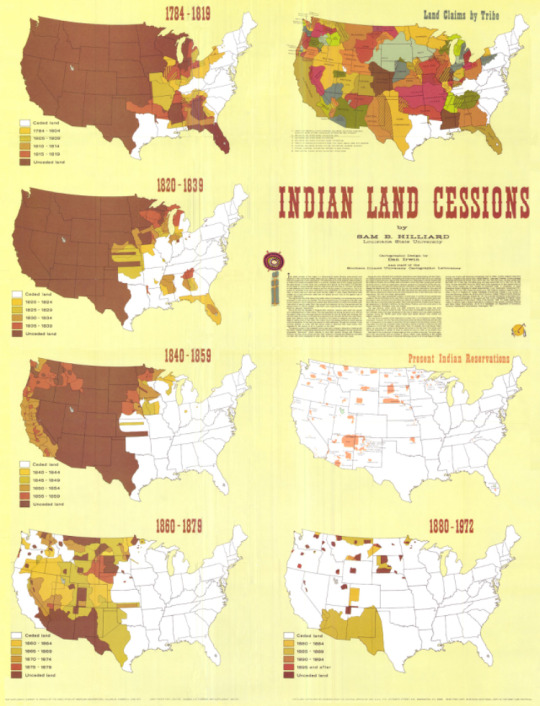
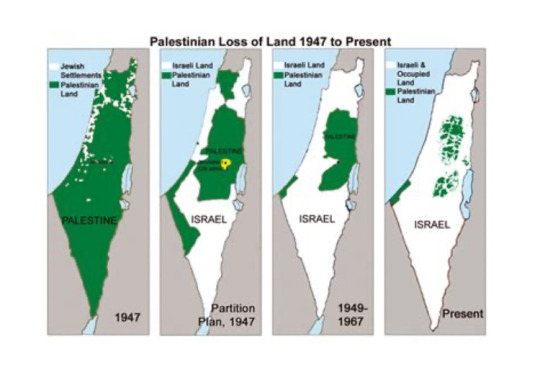
History may not fully repeat itself but it rhymes. Arms embargo now! Land back now!!
#relevant#fascisim#free palestine#history#colonization#end the occupation#illegal settlements#communism#socialism#anarchism#capitalism#late stage capitalism#encroachment#white supremecy#first nations#indigenous#turtle island#Harriet Tubman#Theodor Herzl#Red Cloud#fascist#police state
122 notes
·
View notes
Text
by Jake Wallis Simons
People often forget that Judaism is two millennia older than Islam and 1,500 years older than Christianity. Israel was the cradle of Jewish civilisation. At least a thousand years before the birth of Jesus Christ, Jerusalem’s most famous Jew, King David, made the city the capital of the Land of Israel. It has been home to greater or lesser numbers of Jews – the very word ‘Jew’ is a shortening of Judea, the ancient kingdom radiating from Jerusalem in the Iron Age – in Jerusalem ever since.
Culturally, Jews have always intertwined their identity with the land of Israel, particularly since they were exiled to Babylon around 598 BC, when their powerful yearning for return took hold. For millennia, Jews in the diaspora have prayed facing towards the Holy City, exclaimed ‘next year in Jerusalem’ at Passover, mourned the destruction of the Temple by breaking a glass at weddings, longed to be buried there, prayed at the remaining walls of the destroyed Temple, and visited on pilgrimage. Many throughout history have taken the step of uprooting their families and returning to their homeland. All these practices continue to this day.
A thread can be traced backwards through Jewish history that shows the ancient roots of the ideal of repatriation. Beginning in 1516, Palestine – as it had been renamed by the Romans – fell under Ottoman rule, which would last for more than 400 years. Less than 50 years after the conquest, Joseph Nasi, the Duke of Naxos, a Portuguese Jewish diplomat favoured by the Ottomans, attempted to return Jews to their homeland without regard for scriptural prophecies about awaiting the coming of the messiah. In a way, he was the first Zionist.
The fortunes of the Jews of the Holy Land rose and fell over the following centuries. In 1860, the British financier Sir Moses Montefiore, who believed in the divine providence of the British Empire and the Jewish return to Zion, founded the community of Mishkenot Shana’anim just outside the Old City of Jerusalem. Composed of red-brick alms houses and a windmill, it was the earliest forerunner of the future state (the windmill still stands today).
Modern Jewish migration to Palestine began in 1883 with an influx of 25,000 Jewish arrivals, many fleeing anti-Semitic mobs in Russia and inspired by a desire to return to their ancestral lands. Jews also came from as far afield as Persia and Yemen, grouping into their own neighbourhoods. Immigrants from Bukhara, Uzbekistan, including the Moussaieff family of jewellers who had cut diamonds for Genghis Khan, created the Bukharan Quarter (Shkhunat HaBucharim), with its distinctly Central Asian feel. Their imperative to return had been building for thousands of years.
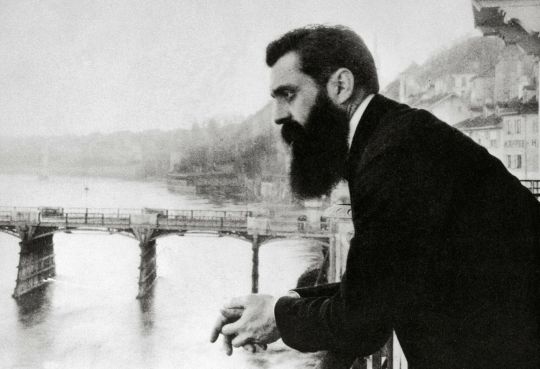
Theodor Herzl in Basel, Switzerland, during the first Zionist Congress, 1897.
Writing in the Jewish Chronicle in 1896, Theodor Herzl, the father of modern Israel, laid out the concept of Zionism. ‘I am introducing no new idea’, he pointed out. ‘On the contrary, it is a very old one. It is a universal idea – and therein lies its power – old as the people, which never, even in the time of bitterest calamity, ceased to cherish it. This is the restoration of the Jewish State.’ He added: ‘It is remarkable that we Jews should have dreamt this kingly dream all through the long night of our history. Now day is dawning. We need only rub the sleep out of our eyes, stretch our limbs, and convert the dream into a reality
24 notes
·
View notes
Text
Something that I'll never understand is when people quote Theodor Herzl when talking about (modern) Israel & Zionism. Like yes, he was one of the people who is sort of like a "founding father" of Zionism, but he's...not directly correlated to Israel (I'm fairly sure). I mean this in the way that people say that when Israel formed, they all believed exactly what Herzl did and were all his "henchmen" (propaganda much?)
Like, I hate to break it to you guys, Herzl died more than 40 (forty) years before modern Israel was formed (he died 1904, the modern state of Israel formed 1948).
(this is more directed to the people on the extremist woke left who always quote Herzl out of context. context is important!!)
*also, modern state of Israel since the ancient kingdoms of Israel were definitely not inspired by Herzl....
27 notes
·
View notes
Video
youtube
Rashid Khalidi: October 7th Revisited | Israel, Palestine, Gaza, Hamas, ...
Abstract:
“Rashid Khalidi is the Edward Said Professor Emeritus of Modern Arab Studies at Columbia University. He was editor of the Journal of Palestine Studies, President of the Middle East Studies Association, and an advisor to the Palestinian delegation to the Madrid and Washington Arab-Israeli peace negotiations from October 1992 until June 1993. In this episode, Rashid and Robinson discuss the history that culminated in October 7th, 2023, what has happened since then, and what might happen in the future. More particularly, they talk about Zionism, the Nakba, how Gaza was created, the war between Israel and Hamas, Egypt’s role in the crisis, the question of genocide, and the future of Palestine. Rashid’s most recent book is The Hundred Years’ War on Palestine (Metropolitan Books, 2021).”
I’ve read Rashid Khalid’s latest book The Hundred Years’ War twice since its release; I’ve found it really informative and very specific in examples and times when Palestinian people have never truly been brokered with in earnest. The intent has always been for Israel to do what it is currently doing in Jabalia. I found the reread especially informative, a lot more gelled into what I’d learned since the first run-through. I honestly thought this first part of the video slapped, where Khalidi talks about his roots in Palestine:
“Well I mean there's a tested history for our family in Jerusalem going back to the time of the Crusades. Possibly earlier but certainly the time of the Crusades or just after. And some of the people who figure in the book, are these 19th century figures, who one of whom was a member of the first ever Ottoman Parliament, Mayor of Jerusalem, ends up writing a letter to Theodore Herzl. Another one, his nephew, was also a deputy of Jerusalem in the 1908 Parliament, and also played a role in the Arab reaction to Zionism. So I mean, they're members of my family who play all kinds of roles in- in- in- Jerusalem and in law, in education and in- and in- politics. I had an uncle who was the last elected Arab mayor of Jerusalem I mentioned him also in the book... yeah he writes to [Theodore Herzl] in 1899 two years after the first Zionist Congress in Basil. And he has lived in Austria you know, Herzel was a Viennese journalist and published in German. His famous book there, Judenstat, the- the state of the Jews, is published in German. And it's clear that Yusfi - who's the person we're talking about, this great great great uncle - had read about the Congress, had read about Zionism. May well have read the book uh, we don't know, but he knew a great deal about Zionism. And so he writes to Herzel and he tells him that, um, he tells him a variety of things. First of all he says that ‘we understand the connection between the Jewish people in the Holy Land, we understand the persecution you're subject to in Europe, we understand where Zionism is coming from.’ So he understands that it's a national project, he understands that it's a reaction to persecution. But he says: ‘you're not taking into account the fact that Palestine is already inhabited by a people that's going to resist being displaced’. At the end he says, ‘for the sake of God, leave Palestine alone.’ And so, this is probably the first recorded anyway ... response by a Palestinian to the very beginnings of Zionism, in 1899. So a couple of years after the first Zionist Congress’.”
Under the cut is an outline of the YouTube above, so you can determine if it’s worth your time w/out clicking all the way to YT. It runs about an hour, but imo it's fine just listening.
OUTLINE 00:00
Introduction 04:04
Is the Israel-Hamas War an American War? 07:33
The Nakba Versus the Bible 18:52
Is All Zionist History Propaganda? 28:45
Has Gaza Become a Concentration Camp? 40:21
Is Israel Committing Genocide in Gaza? 46:52
Can Israel’s War Crimes Against Gaza Be Justified? 51:30
Is Egypt Responsible for the Gaza Crisis? 54:30
Is the Israel-Hamas War Just Beginning? 01:00:07
How Soon Will Israel Conquer Gaza? 01:05:19
Rashid’s Hope for the Future of Israel and Palestine
The Hundred Years’ War on Palestine: https://a.co/d/7Mrwuz9
The Neck and the Sword: https://shorturl.at/N7HRo
A New Abyss (The Guardian Long Read): https://shorturl.at/oVn5j
Some info re: the host & interviewer. Robinson’s Website: http://robinsonerhardt.com Robinson Erhardt researches symbolic logic and the foundations of mathematics at Stanford University. Join him in conversations with philosophers, scientists, historians, economists, and everyone in-between.
#youtube#books#rashid khalidi#israel#palestine#free palestine#free gaza#eyes on north gaza#eyes on Jabalia#israel is committing genocide#zionism#Theodore herzl#video#history#west asia#hamas#egypt#current events#book rec
0 notes
Text

I want you to look at my labor of love
50 notes
·
View notes
Text
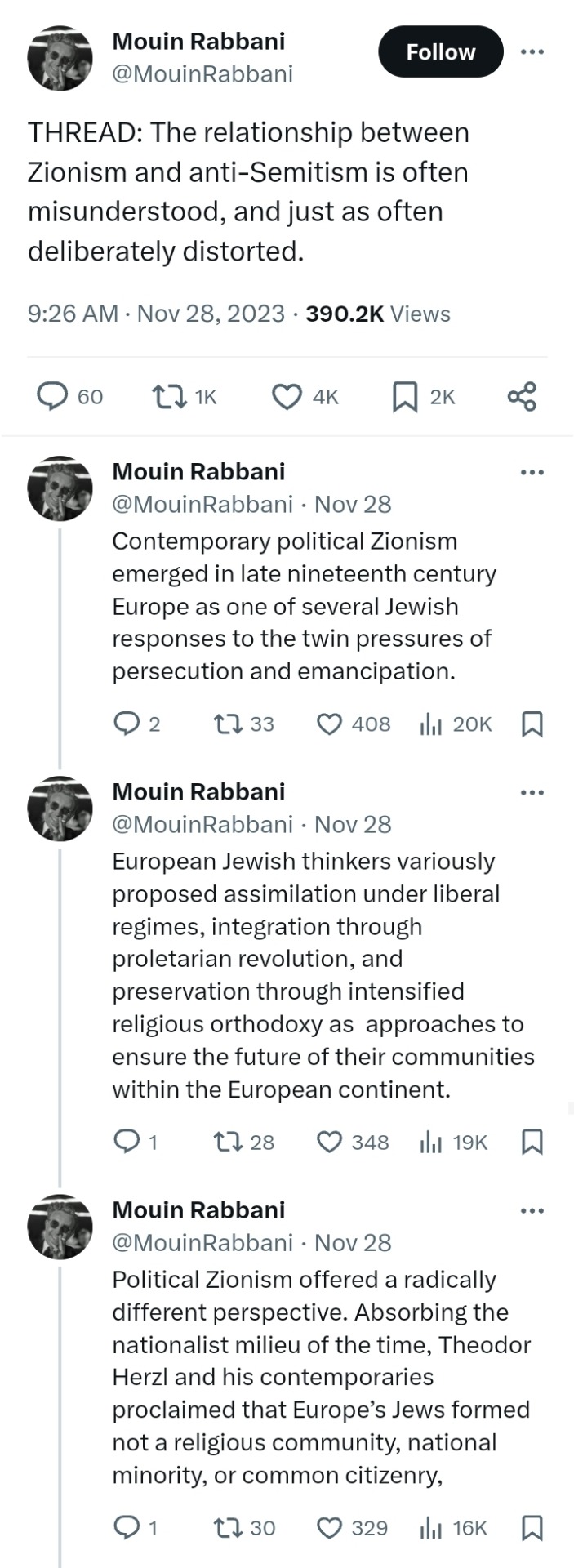
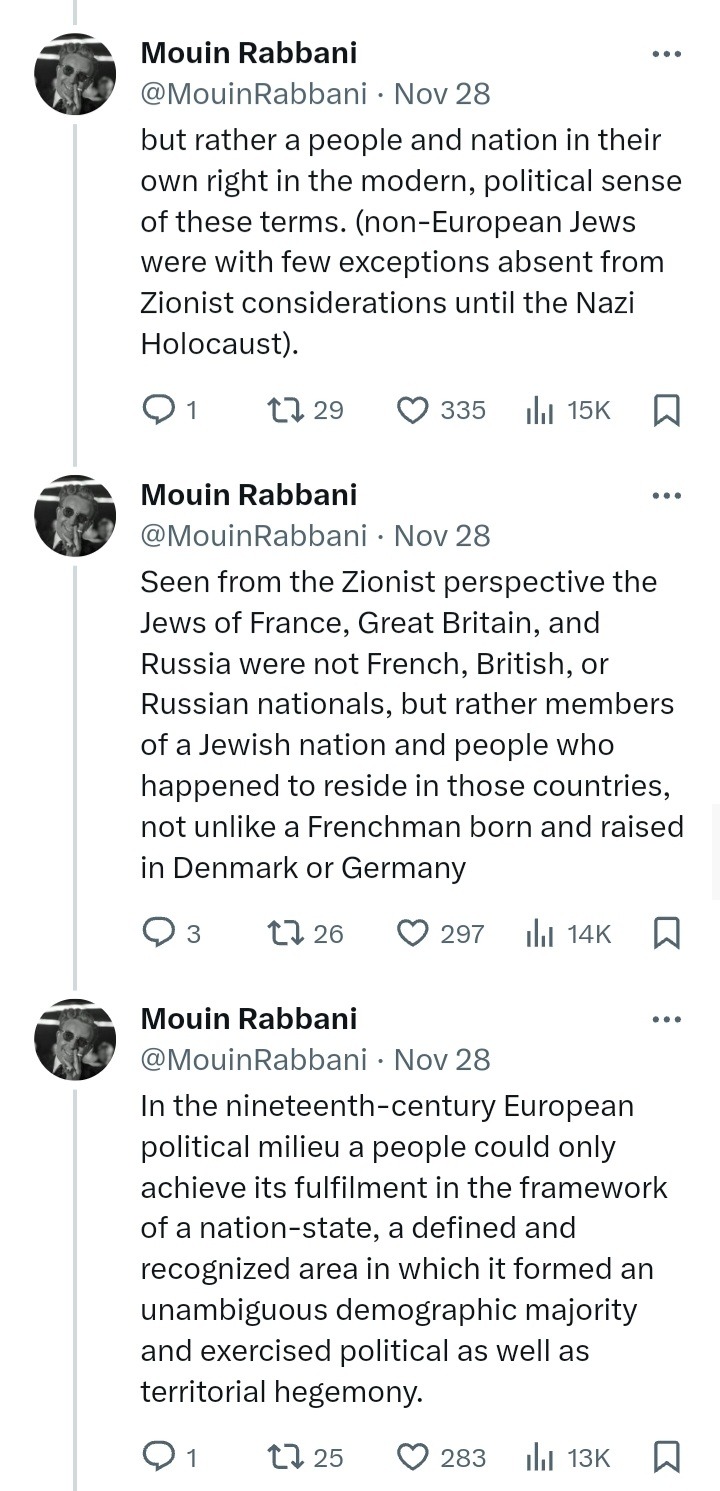
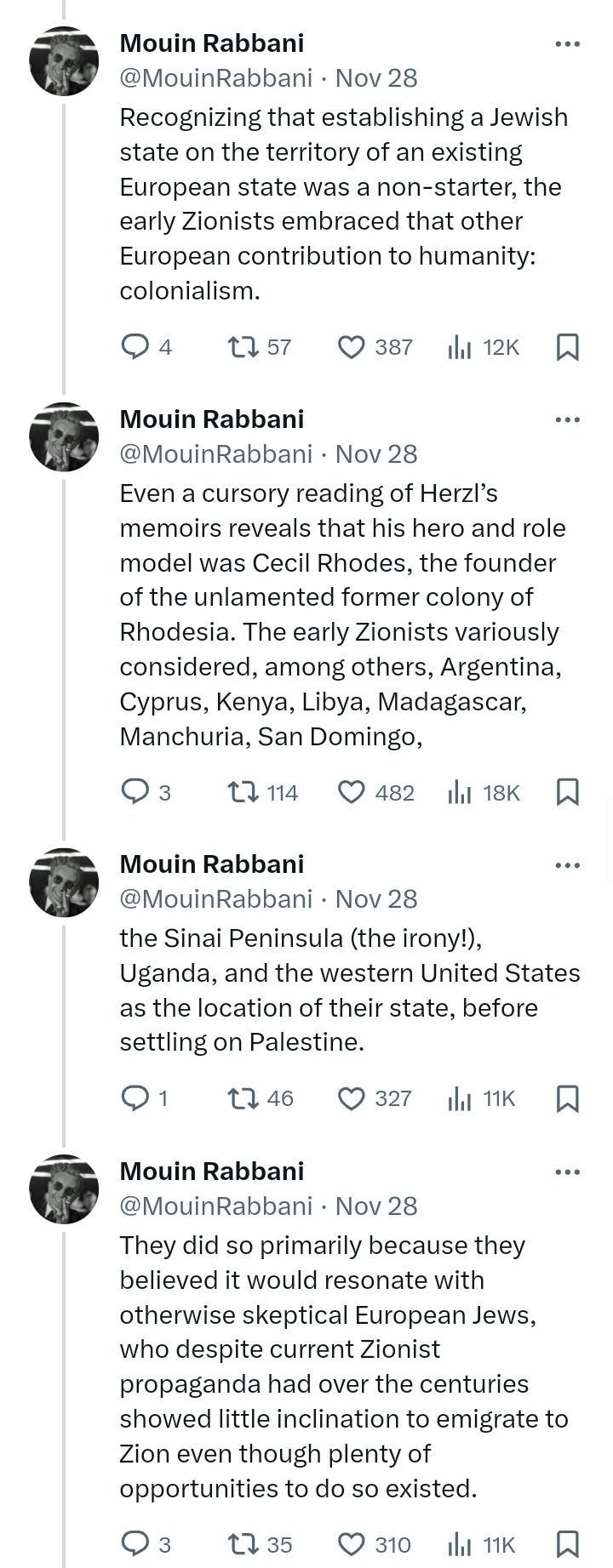
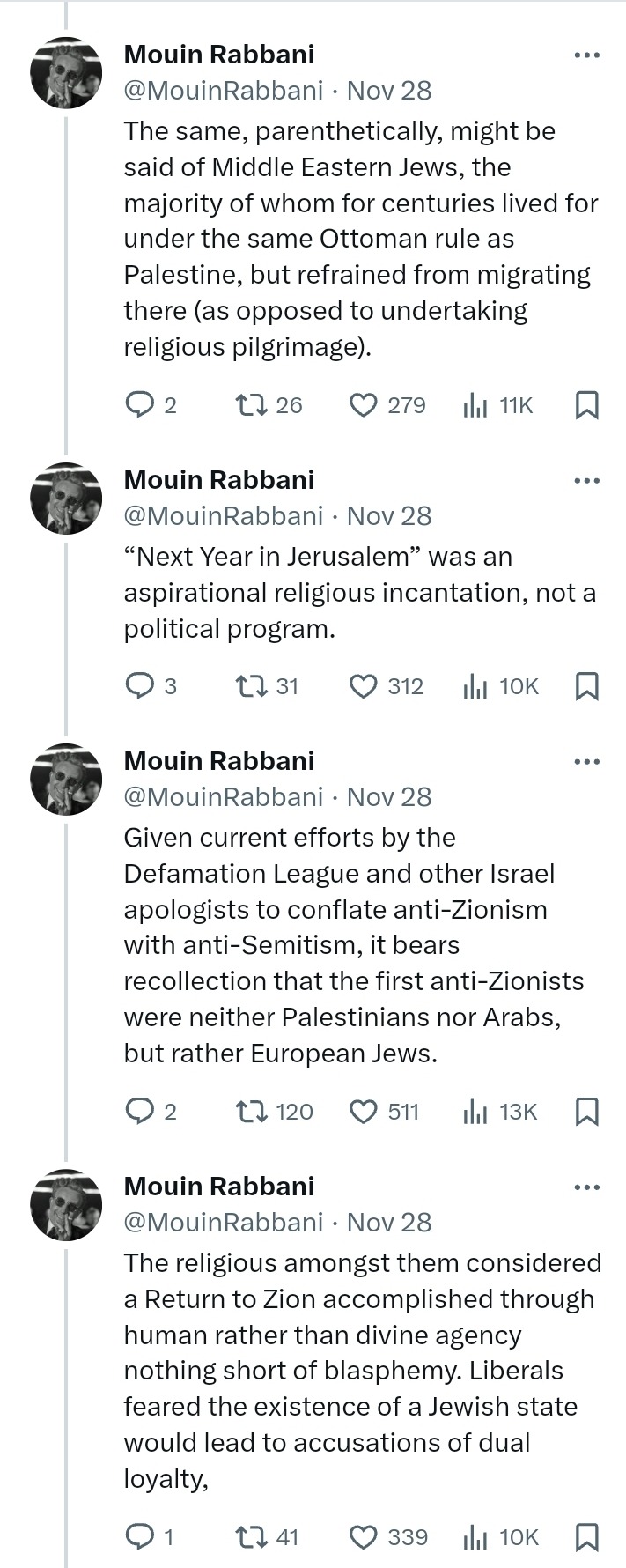
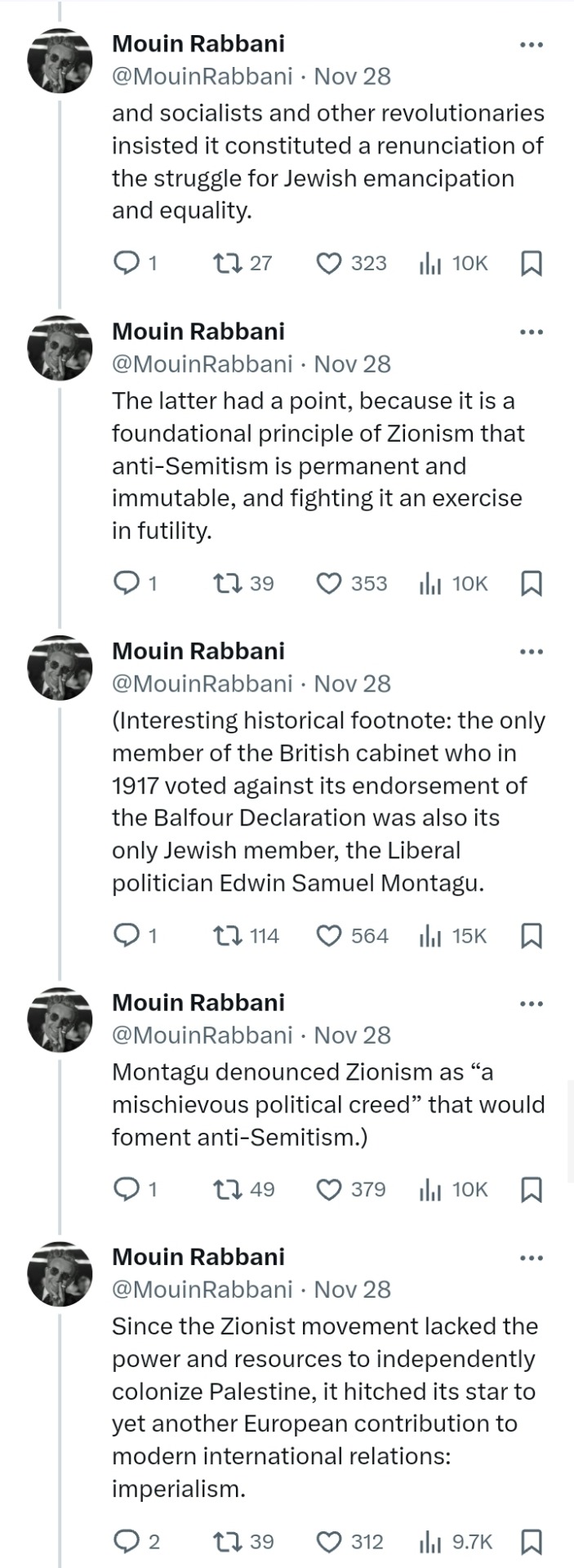
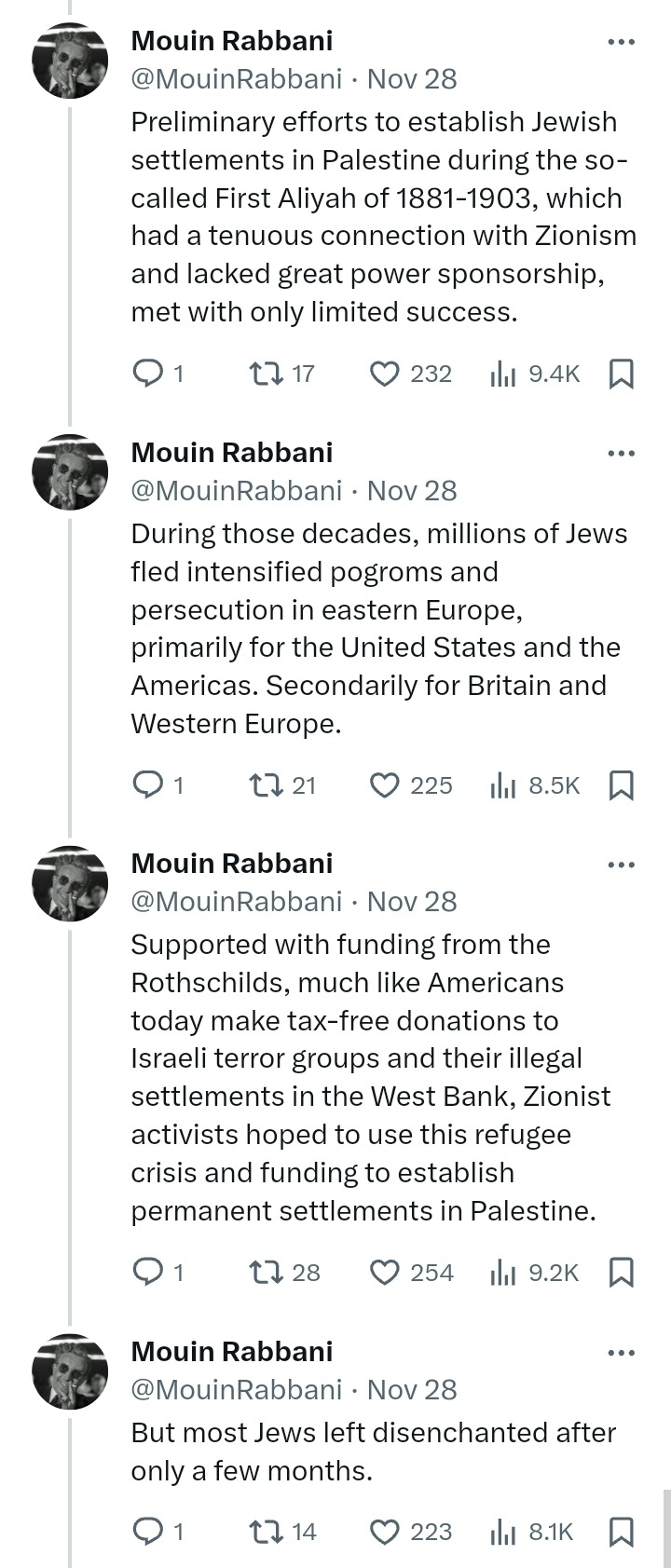
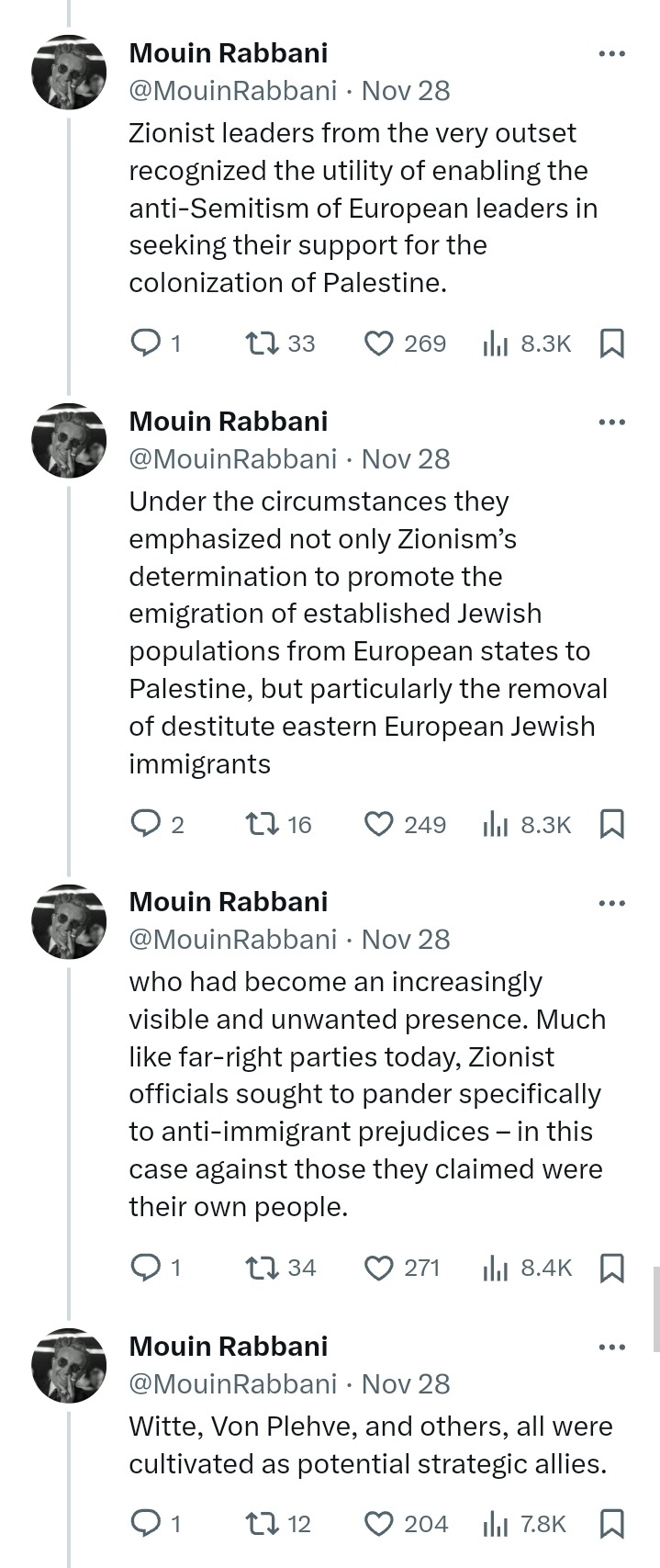
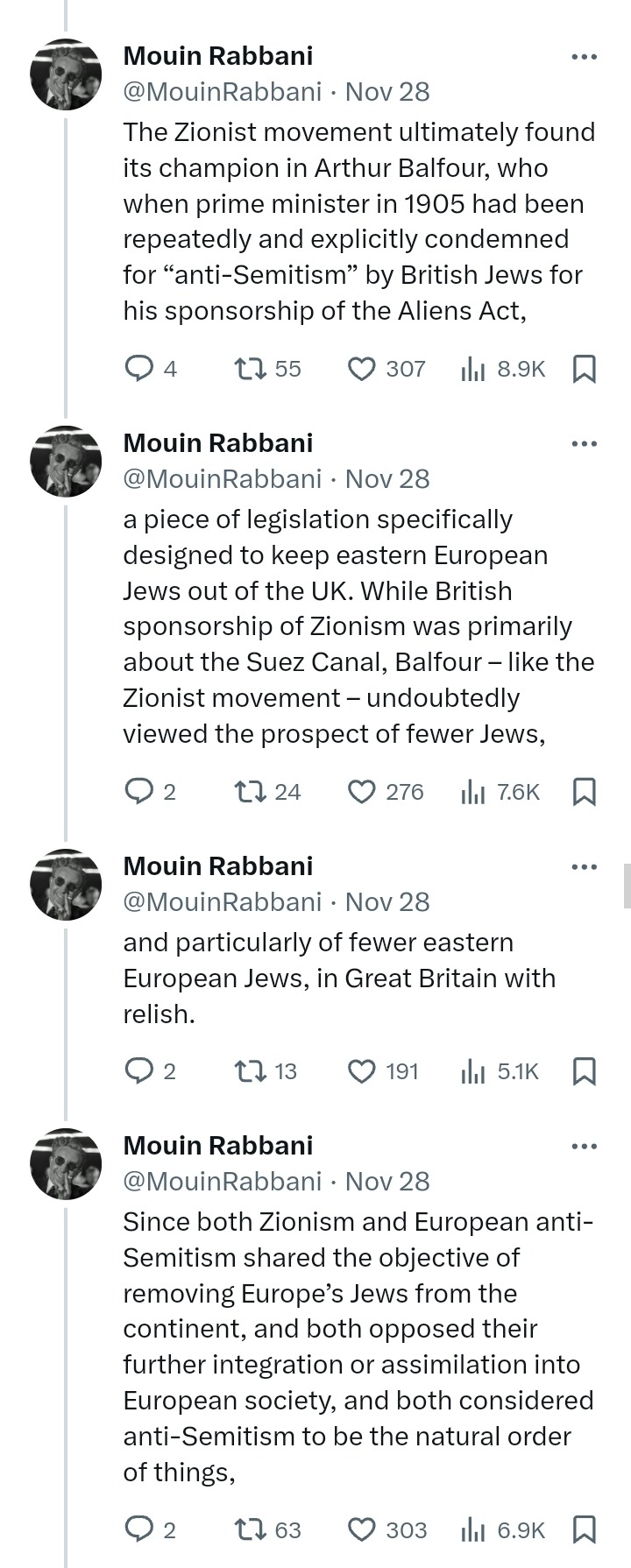
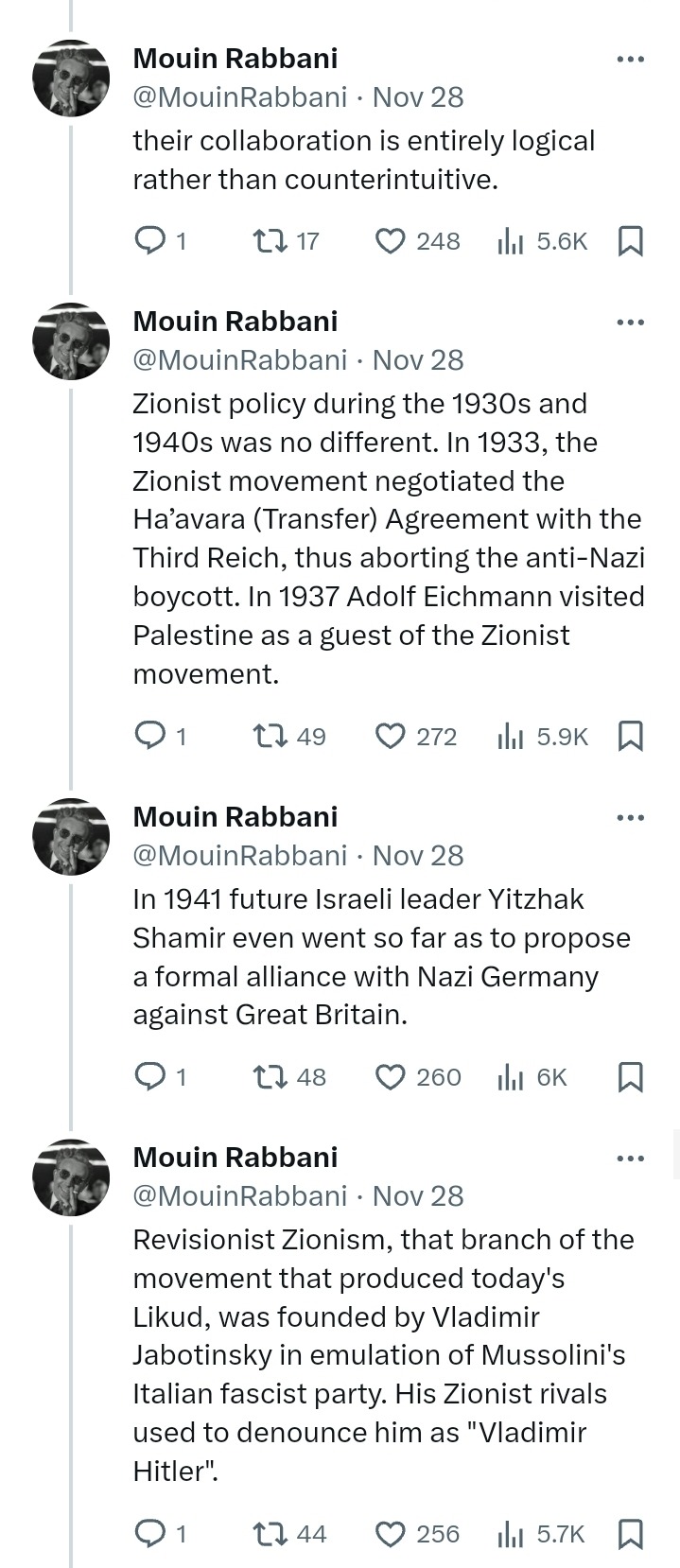
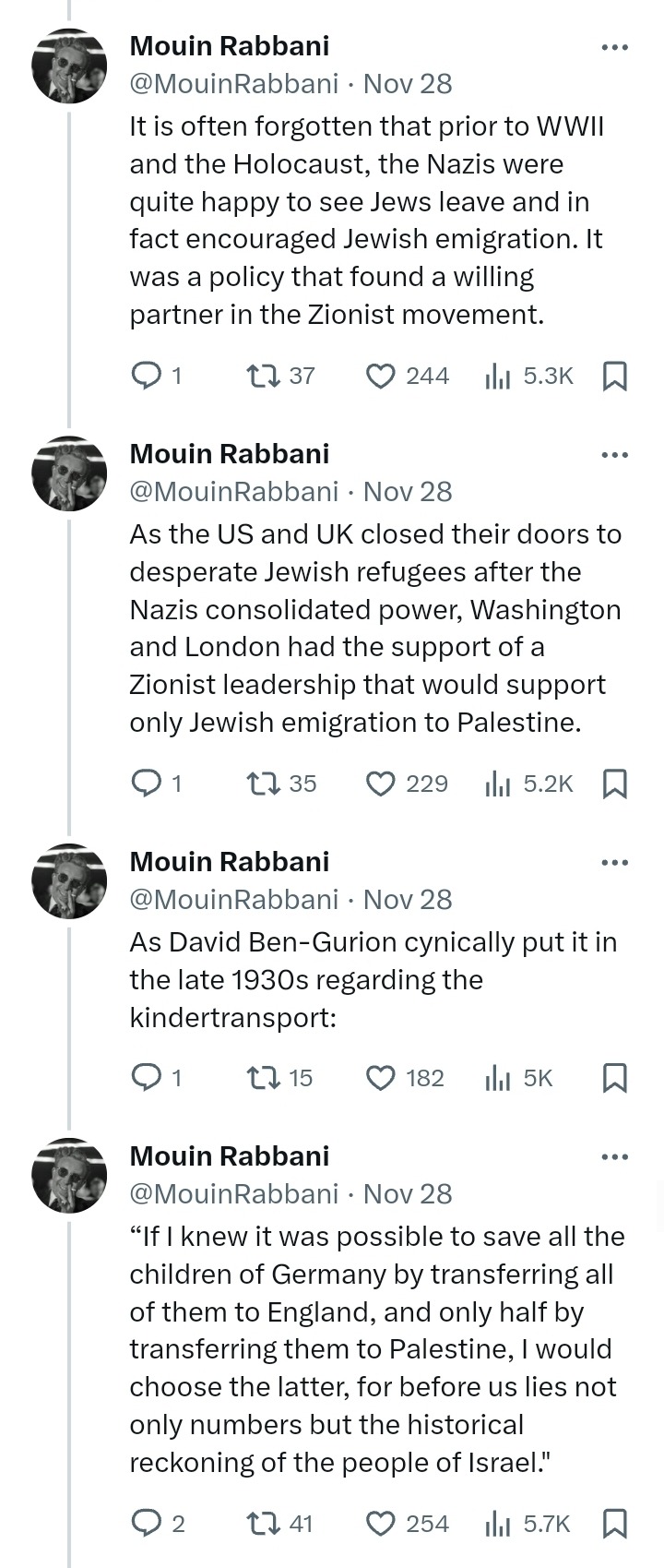
(cont'd in reblog.)
#free palestine#anti zionisim#anti zionist#colonization#imperialism#apartheid#antisemitism#world history#western imperialism#theodor herzl#colonialism#balfour declaration#cecil rhodes#racism#anti blackness#zionist propaganda#settler colonialism#palestinian genocide#christian zionism#xenophobia#immigration#middle east#islamphobia#david ben gurion#holocaust#nazi germany#MENA#knee of huss#xtianty
68 notes
·
View notes
Text
" Un pensiero o idea di trasferimento [del popolo palestinese risale] ai primi tempi del movimento sionista, come mostrerebbe un'annotazione del diario di Theodor Herzl: «Dobbiamo espropriare con delicatezza. […] Cercheremo di indurre la popolazione in miseria ad attraversare il confine procurandole un'occupazione nei paesi di transito; negandogliela, però, nel nostro. […] Il processo di espropriazione e di sgombero dei poveri deve avvenire con discrezione e circospezione.»¹ A distanza di quarant'anni, Ben-Gurion ribadiva il concetto: «Il trasferimento di popolazione è già avvenuto nella valle di Jezreel, nella piana del Sharon e in altri luoghi. Siete a conoscenza del lavoro del Fondo nazionale ebraico in proposito. Ora occorre realizzare un trasferimento di ben altre dimensioni.»² Durante la guerra del 1948, Ben-Gurion mise in pratica le sue raccomandazioni. In una campagna nota come "Operazione Hiram" fu realizzato un trasferimento indiscriminato di popolazione dalla Galilea. Durante questa campagna, ha scritto Morris, le forze armate sioniste eseguirono "un numero insolitamente elevato di esecuzioni di popolazione civile contro muri o nei pressi di un pozzo con notevole metodicità". Molto scrupolosamente, Morris cita ventiquattro episodi di terrorismo o di massacro, di cui i più efferati ebbero luogo a Saliha (78 uccisi), Lod (250), Dawayima (centinaia) e, ovviamente, nel già citato villaggio di Deir Yassin. Alcuni di questi massacri furono probabilmente perpetrati per ragioni tattiche: a Dawayima, nei pressi di Hebron, per esempio, "una colonna entrò nel villaggio sparando all'impazzata e uccise qualsiasi cosa si muovesse". Altri massacri rispondevano, invece, all'intento strategico di terrorizzare la popolazione affinché fuggisse. Questi massacri non furono certo tenuti nascosti dalla popolazione palestinese. Dopotutto, come ebbe a dire una volta Lenin, l'intento del terrorismo è terrorizzare. (Morris, ricordiamo per inciso, ha giustificato i sionisti richiamandosi alla logica del ben noto aforisma di Lenin: "Per fare la frittata occorre rompere le uova").
Secondo un testimone oculare di Deir Yassin: «Deir Yassin era un villaggio che fu attaccato dagli israeliani, o dai sionisti, il 9 aprile 1948. […] Incontrerà delle persone che le diranno: "Questo è quello che successe a Deir Yassin", perché loro erano là. Ho incontrato una donna che mi ha detto che le portarono suo figlio e le dissero di prenderlo in grembo e poi lo uccisero. Usavano coltelli, baionette. Un macello; non un combattimento. Non c'era nessuno da combattere. Erano prevalentemente donne e bambini. Molte, moltissime persone furono massacrate in quel villaggio. Questo massacro terrorizzò l'intera Palestina. Tutti parlavano del massacro di Deir Yassin.» Complessivamente, furono cancellati oltre cinquecento villaggi palestinesi. La maggior parte dei palestinesi che fuggì fini in Cisgiordania, nella striscia di Gaza, nei paesi arabi limitrofi. Quelli con un certo grado di istruzione, con specializzazioni o disponibilità economica cercarono di rifarsi una vita meglio che poterono, talvolta in luoghi lontani come il Golfo persico, l'Europa, le Americhe. Quelli che non furono altrettanto fortunati finirono nei campi profughi, organizzati, inizialmente, dallo United Nations Releif for Palestine (Unrp). "
¹ B. MORRIS, Revisiting the Palestinian Exodus of 1948, in E. L. ROGAN e A. SHLAIM (a cura di), The War of Palestine, Rewriting the History of 1948, Cambridge University Press, Cambridge, 2001, p. 41 [trad. it. La guerra per la Palestina: riscrivere la storia del 1948, Il Ponte, Bologna, 2004]. ² Ibidem, p. 43.
---------
James L. Gelvin, Il conflitto israelo-palestinese. Cent'anni di guerra, traduzione di Piero Arlorio, Einaudi (collana Piccola Biblioteca Einaudi n° 357), 2007¹; pp. 179-181.
[Edizione originale: The Israel-Palestine Conflict, Cambridge University Press, 2005]
#James L. Gelvin#Palestina#Israele#Il conflitto israelo-palestinese#saggi#saggistica#libri#letture#leggere#Medio Oriente#questione palestinese#Gaza#Cisgiordania#Territori occupati#sionismo#nazionalismi#resistenza#Giordania#citazioni#Theodor Herzl#David Ben Gurion#Fondo nazionale ebraico#deportazioni#Operazione Hiram#Benny Morris#Nuova storiografia israeliana#crimini di guerra#pulizia etnica#genocidio#diaspora palestinese
25 notes
·
View notes
Text
"Herzl replied—and quickly, in a letter on March 19. His letter was probably the first response by a leader of the Zionist movement to a cogent Palestinian objection to its embryonic plans for Palestine. Herzl simply ignored the letter’s basic thesis, that Palestine was already inhabited by a population that would not agree to be supplanted. Although Herzl had visited Palestine once, in an 1898 visit timed to coincide with that of German Kaiser Wilhelm II, he (like most early European Zionists) had not much knowledge of or contact with its native inhabitants. Glossing over the fact that Zionism was ultimately meant to lead to Jewish control of Palestine, Herzl deployed a justification that has been a touchstone for colonialists and that would become a staple argument of the Zionist movement: Jewish immigration would benefit Palestine’s Indigenous inhabitants. “It is their well-being, their individual wealth, which we will increase by bringing in our own,” Herzl wrote, adding that “no one can doubt that the well-being of the entire country would be the happy result.” Herzl’s letter addressed a consideration that Yusuf Diya had not even raised: “You see another difficulty, Excellency, in the existence of the non-Jewish population in Palestine. But who would think of sending them away?” But Herzl had underestimated his correspondent. From Yusuf Diya’s letter, it is clear that he understood perfectly well that at issue was not the immigration of (as Herzl put it) “a number of Jews” into Palestine, but rather the transformation of the entire land into a Jewish state. Instead, Herzl offered the preposterous inducement that the colonization, and ultimately the usurpation, of their land by strangers would benefit the people of that country. Herzl’s reply to Yusuf Diya appears to have been based on the assumption that the Arabs could ultimately be bribed or fooled into ignoring what the Zionist movement actually intended for Palestine. This condescending attitude toward the intelligence, not to speak of the rights, of the Arab population of Palestine was to be serially repeated by Zionist, British, European, and American leaders in the decades that followed, down to the present day. As for the Jewish state that was ultimately created by the movement that Herzl founded, as Yusuf Diya foresaw, there was to be room for only one people, the Jewish people. As for the others, “sending them away” was indeed what happened, despite Herzl’s disingenuous remark." - Rashid Khalidi, The Hundred Years' War on Palestine: A History of Settler Colonialism and Resistance, 1917–2017
79 notes
·
View notes